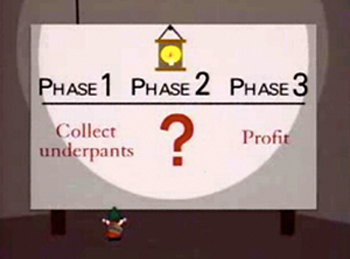This article is more than 1 year old
McNealy to Ellison: How to duck death by open source
Ex-Sun boss talks code, community, and underpants
Money from underpants
It couldn't have come at a worse time. Southeastern needed revenue model Plan B at a time when Sun's high-end Solaris server sales dried up in late 2008 as the economy went south. Everybody was suffering, but Sun hadn't recovered from the 2001 crash. Southeastern had no use for a software strategy founded on a theory and that was failing to deliver.
Today, Sun's formerly failing open source software is in Ellison's hands, and Ellison has made it pretty damn clear that open source is there to serve his goal of profit, and not some exercise in corporate self-indulgence. The marching orders are clear: Oracle, not the community, owns Sun's open source projects, therefore Oracle and not the community will run them. Sun's open-source software contains Sun IP that Oracle now owns, so Sun's IP will serve Oracle's greater business interests. Additional time and money spent by Oracle on Sun open source will deliver a return on investment to, you got it, Oracle.

Sun's business plan for open source software in the 2000s
Oracle has trademark ownership, too, so good luck building that level of brand recognition for your MySQL and OpenOffice splinter.
Oracle's strategy is alienating it from those who'd bathed in Sun's collegiate ways.
Is there, then, a teachable moment here? A moment that McNealy can impart to Ellison, given that McNealy is a career-long fan of marrying open source with commerce since he picked up BSD and ran with it in SunOS, and then teamed up with Unix's then-owner AT&T to sink SunOS into Unix System V Release 4 in 1990?
McNealy, after all, likes to boast how Sun donated an "enormous" amount of its R&D to the community, and he identifies Sun as the Red Hat of Berkeley Unix. Any lessons the old dog of open systems can teach the brash database king?
Sure, McNealy tells us: put your shareholders first.
Wait — what? That's the language of Ellison!
"We probably got a little too aggressive near the end and probably open sourced too much and tried too hard to appease the community and tried too hard to share," McNealy said. "You gotta take care of your shareholders or you end up very vulnerable like we got. We were a wonderful acquisition — we got stolen for a song at the bottom of the Dow."
"That's the message," McNealy tells us. "You gotta strike a proper balance between sharing and building the community and then monetizing the work that you do... I think we got the donate part right, I don't think we got the monetize part right.'
Does McNealy then think that Larry is handling MySQL, OpenOffice, OpenSolaris, and Java well? Oracle is throwing its weight around on Java, created by Sun, claiming Google's Android violates Oracle-owned patents, and is claiming ownership of trademarks on MySQL and OpenOffice — a move that prevents others using those names on their forks.
Speaking at PostgreSQL West 2010, McNealy was blunt on where he stands. He believes in patents and copyright law. Ellison is exercising his rights of patent ownership in Java and open source.
"Do I have a problem with Larry Ellison buying Sun? No. That's part of the capitalist system. As soon as we go public we are for sale. Do I have a problem with him exercising his legal IP rights? No. Would it be how I run and operate? No. But I was a good capitalist, he's a great capitalist," McNealy told Pg West 2010 last month.
The right thing
Open sourcers are mourning the loss of Sun and ruing Oracle's subsequent inheritance. Is McNealy surprised about the way things have turned out on Java and Sun's open-source projects?
McNealy deflects. This wasn't a consideration when it came to selling, he explains. His objectives were value for shareholders and as few layoffs as possible. Prior to sale, Sun was in the midst of dumping a fifth of its 33,400-strong workforce as part of a restructuring.
"It was not an issue of can I do the right thing," he said of Java and open source. "We were a public company. There was a legal tender for us, there were bids in from other companies. At that point when you're in play, it's a question of how do you maximize shareholder value and how do you create an environment where the most Sun employees will maintain their jobs — those were the two things I was worried about.
